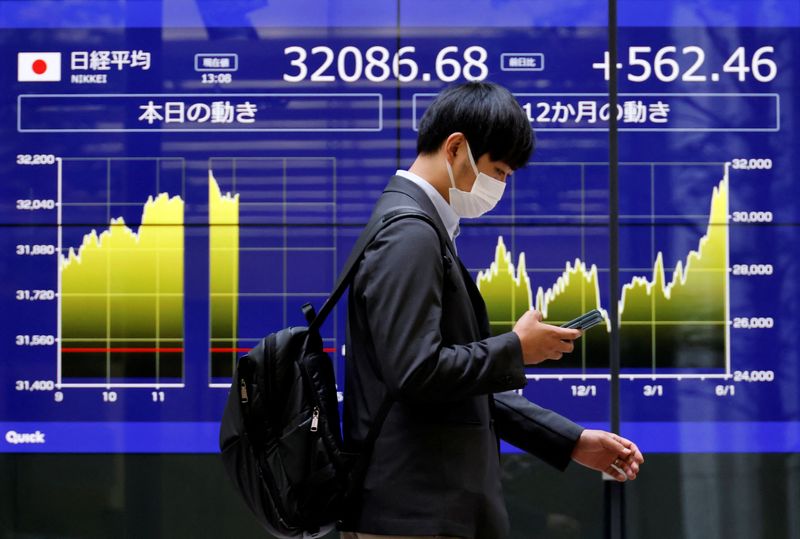 © Reuters. FILE PHOTO: A man walks past an electric monitor displaying Japan's Nikkei share average and recent movements, outside a bank in Tokyo, Japan, June 5, 2023. REUTERS/Issei Kato
© Reuters. FILE PHOTO: A man walks past an electric monitor displaying Japan's Nikkei share average and recent movements, outside a bank in Tokyo, Japan, June 5, 2023. REUTERS/Issei Kato
By Marc Jones and Koh Gui Qing
LONDON/NEW YORK (Reuters) - World shares edged higher on Tuesday as investors mulled whether a recent rally in stocks has legs to run further, while Treasury yields drifted higher as traders pared bets that U.S. rate cuts are on the horizon given sticky price pressures.
Wall Street, where the S&P 500 touched a near 10-month high on Monday, was in the black. The S&P 500 index rose 0.1%, the Dow Jones Industrial Average was little changed, and the Nasdaq Composite Index climbed 0.25%.
The pan-European STOXX 600 index rose 0.38%, while MSCI's broadest index of Asia-Pacific shares outside Japan was little changed. That left the MSCI's broadest index of world stocks up 0.21%.
With major share markets all in the black, investors might think that stocks are set to rise further. Yet some analysts warned investors against false optimism.
Australia's central bank delivered a surprise interest rate hike on Tuesday, and while investors mostly expect the Federal Reserve to abstain from raising rates next week, some analysts cautioned that more rate hikes by the Fed are on the cards.
"We would be careful not to give in completely to FOMO (fear of missing out)," analysts at Bank of America (NYSE:BAC) Securities said.
"A skipped hike is not a pause, inflation still handcuffs the Fed (no high-strike Fed put), and a U.S. recession remains on the horizon."
The two-year Treasury yield, which typically moves in step with interest rate expectations, rose to 4.5225%, while the yield on 10-year notes inched up to 3.7043%. [US/]
Government bond yields - a proxy for borrowing rates - eased earlier after a European Central Bank (ECB) survey showed euro zone consumers had lowered their inflation expectations. [GVD/EUR]
British retail sales growth also slowed to a seven-month low as soaring food prices prompted shoppers to rein in spending on non-essential items, but that contrasted with the overnight action from down under.
Australia's central bank hiked rates by a quarter-point to 4.1% - an 11-year high - and warned that further increases might be required to ensure inflation is brought back under control.
That pushed up the Aussie dollar and set the bar for a slew of key rate decisions elsewhere in the next couple of weeks, starting with Canada on Wednesday, which could also squeeze in another hike, TD Securities Senior Global Strategist James Rossiter said.
"The last few months have been completely distracted by the banking crises and the U.S. debt ceiling issue, but now we are very much back to the macro dynamics driving central banks and where their terminal rates are going to be."
"The issue is that inflation is just not playing as nice as everybody expected and central banks are really struggling with this," he added.
The U.S. Federal Reserve, the ECB and Bank of Japan all hold meetings next week.
Data on Monday showing the U.S. services sector barely grew in May has left markets pricing in an 82% chance of the Fed taking a pause in its rapid hiking cycle, a sharp jump from a 36% chance a week earlier, according to the CME FedWatch tool.
The dollar index, which measures the greenback against the main global currencies, managed to nudge higher, up 0.17%.
But it was the 0.7% jump in the Aussie dollar after the overnight surprise from the Reserve Bank of Australia that led the market. By mid-day in New York, the Aussie was up 0.86% at $0.6672. [/FRX]
The euro slipped 0.26% to back under $1.0684, while the yen was steady at 139.675 per dollar and sterling fetched $1.24230, flat on the day.
CRYPTO CRACKDOWN
There was more bad news in the cryptocurrency markets, as the U.S. Securities and Exchange Commission sued the largest U.S. crypto asset trading platform, Coinbase (NASDAQ:COIN), a day after also suing crypto exchange Binance.
Bitcoin managed to hold its ground, though, rising 2.8% to $26,446.
Data firm Nansen estimated that around $790 million had been pulled from Binance and its U.S. affiliate in the last 24 hours.
Among commodities, oil prices fell after jumping on Monday following news that the world's top exporter, Saudi Arabia, would further cut output. Brent lost 0.38% to stand at $76.43, and U.S. crude fell 0.33% to $71.91.

